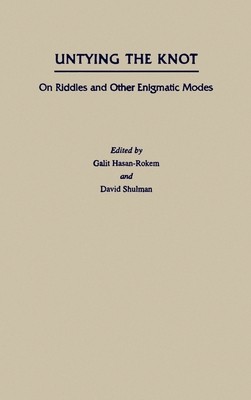
- Išsiųsime per 10–14 d.d.
- Leidėjas: Oxford University Press, USA
- ISBN-10: 0195101863
- ISBN-13: 9780195101867
- Formatas: 16.3 x 24.2 x 2.7 cm, kieti viršeliai
- Kalba: Anglų
- Extra -25 % nuolaida šiai knygai su kodu: ENG25
Untying the Knot (el. knyga) (skaityta knyga) | knygos.lt
Atsiliepimai
Aprašymas
This book collects eighteen previously unpublished essays on the riddle--a genre of discourse found in virtually every human culture. Hasan-Rokem and Shulman have drawn these essays from a variety of cultural perspectives and disciplines; linguists, anthropologists, folklorists, and religion and literature scholars consider riddling practices in Hebrew, Finnish, Indian languages, Chinese, and classical Greek. The authors seek to understand the peculiar expressive power of the riddle, and the cultural logic of its particular uses; they scrutinize the riddle's logical structure and linguistic strategies, as well as its affinity to neighboring genres such as enigmas, puzzles, oracular prophecy, proverbs, and dreams. In this way, they begin to answer how riddles relate to the conceptual structures of a particular culture, and how they come to represent a culture's cosmology or cognitive map of the world. More importantly, these essays reveal the human need for symbolic
ordering--riddles being one such form of cultural ritual.
EXTRA 25 % nuolaida su kodu: ENG25
Akcija baigiasi už 5d.02:45:40
Nuolaidos kodas galioja perkant nuo 10 €. Nuolaidos nesumuojamos.

- Leidėjas: Oxford University Press, USA
- ISBN-10: 0195101863
- ISBN-13: 9780195101867
- Formatas: 16.3 x 24.2 x 2.7 cm, kieti viršeliai
- Kalba: Anglų Anglų
This book collects eighteen previously unpublished essays on the riddle--a genre of discourse found in virtually every human culture. Hasan-Rokem and Shulman have drawn these essays from a variety of cultural perspectives and disciplines; linguists, anthropologists, folklorists, and religion and literature scholars consider riddling practices in Hebrew, Finnish, Indian languages, Chinese, and classical Greek. The authors seek to understand the peculiar expressive power of the riddle, and the cultural logic of its particular uses; they scrutinize the riddle's logical structure and linguistic strategies, as well as its affinity to neighboring genres such as enigmas, puzzles, oracular prophecy, proverbs, and dreams. In this way, they begin to answer how riddles relate to the conceptual structures of a particular culture, and how they come to represent a culture's cosmology or cognitive map of the world. More importantly, these essays reveal the human need for symbolic
ordering--riddles being one such form of cultural ritual.




Atsiliepimai